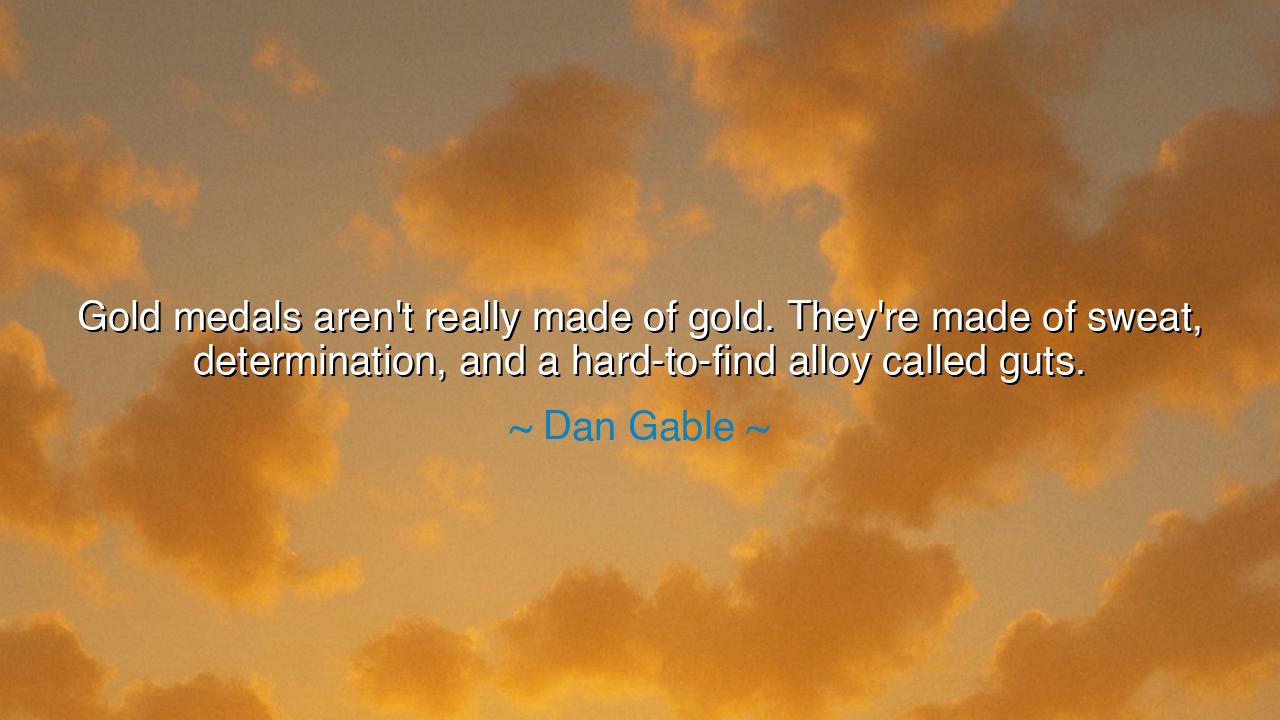
Gold medals aren't really made of gold. They're made of sweat
Gold medals aren't really made of gold. They're made of sweat, determination, and a hard-to-find alloy called guts.






Hearken, O seeker of wisdom, to the words of Dan Gable, the immortal wrestler and master of discipline, who proclaimed: “Gold medals aren't really made of gold. They're made of sweat, determination, and a hard-to-find alloy called guts.” In this declaration lies a timeless meditation on effort, courage, and the true nature of achievement. Gable reminds us that honor and triumph are not bestowed by circumstance or chance, but forged in the furnace of relentless toil and indomitable spirit.
Since the earliest contests of men, mortals have recognized that victory is not merely the adornment of symbols, but the culmination of relentless effort. The gladiators of Rome, the athletes of Olympia, and the warriors of Sparta earned their crowns and laurels not through fortune alone, but through unceasing preparation, discipline, and courage in the face of adversity. Gable’s words echo this ancient wisdom: medals are the outward sign of the inner fire that drives the human soul.
In the arena of sport, sweat and determination are tangible proof of dedication. Gable, in his own wrestling career, labored through countless hours of practice, endurance, and mental preparation. Each match, each hold, each struggle tested both body and spirit. The gold medal, while radiant, is merely the emblem; it is the grit, resilience, and daring courage of the athlete that constitutes its true substance.
Consider the story of Alexander the Great, who conquered lands beyond imagination. His victories were not granted by birthright or favor, but by discipline, strategy, and unyielding courage in the face of overwhelming odds. Like Gable’s metaphorical medal, Alexander’s triumph was forged from persistence, intellect, and the willingness to endure hardship. The visible reward—land, titles, and acclaim—was but the outward manifestation of the inner fire that propelled him forward.
The ancients also understood that courage is the cornerstone of achievement. The Stoics, from Seneca to Marcus Aurelius, taught that the measure of a man is revealed in action, perseverance, and moral fortitude, not in the adornments of fortune. Gable’s words resonate with this teaching: the medal, like wealth or praise, is ephemeral; the strength of character, the courage to endure, and the relentless determination are eternal.
This principle extends beyond sport and conquest. In art, leadership, science, and craft, the fruits of excellence are realized only through dedication, practice, and the courage to face failure. The painter perfects each stroke through repetition, the scholar refines thought through scrutiny, and the leader molds success from perseverance in adversity. In each case, as Gable notes, the reward is a testament to sweat, determination, and courage, not merely the symbol that commemorates it.
The lesson, therefore, is clear: cultivate courage, discipline, and relentless effort in all endeavors. Practical actions follow: engage in deliberate practice, endure hardship with patience, embrace challenges as opportunities to refine character, and measure success by the strength of your effort rather than the accolades received. By doing so, every triumph becomes the reflection of inner mastery, not just external recognition.
Walk forward, O listener, as Gable strode upon the mat, body weary, spirit unbroken, heart aflame with courage. Let his words echo through your life: gold medals aren't really made of gold; they're made of sweat, determination, and a hard-to-find alloy called guts. In this enduring truth lies the wisdom of the ancients: true achievement is forged in toil, tempered by courage, and immortalized in the unwavering spirit of those who dare to strive.






AAdministratorAdministrator
Welcome, honored guests. Please leave a comment, we will respond soon